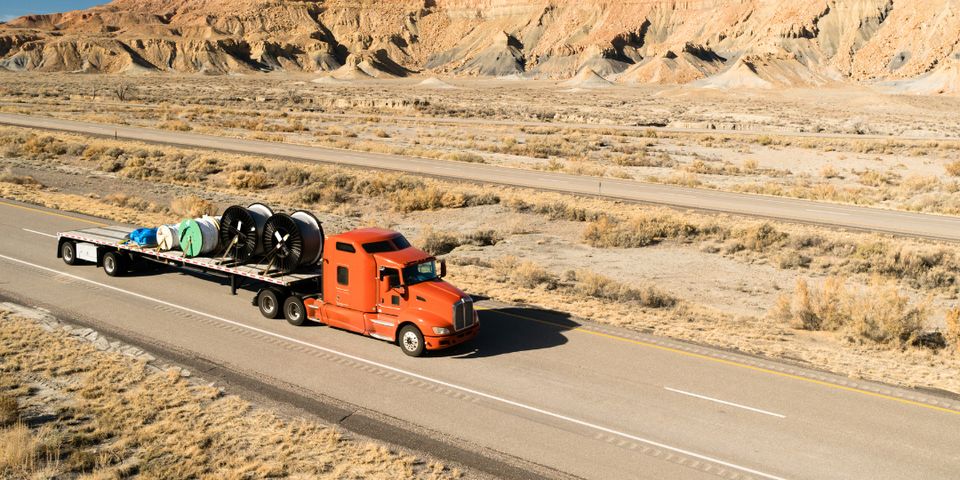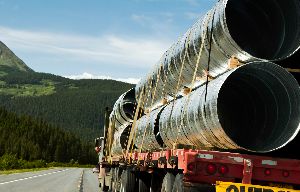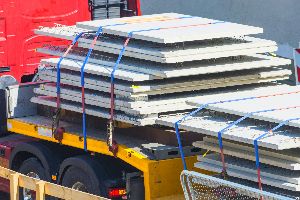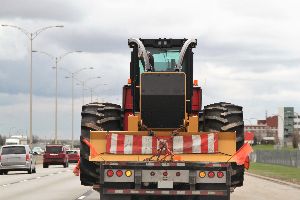
When you ship items via flatbed trucking, your cargo is carried in an open trailer that consists of a flat surface and no sides or roof. Rising product demand in the construction, energy, and manufacturing sectors has led to a significant increase in the use of flatbed shipping, an upward trend that is likely to continue as the economy recovers from pandemic-related challenges. Here's what you need to know about this beneficial shipping option.
What Are the Types of Flatbed Shipping?
The most common forms include step-deck trailers, which hold tall cargo that exceeds the legal height limit of a standard flatbed. These trailers typically contain an upper deck and a lower deck and often have ramp capabilities. Drivers and operators do not need to obtain any special permits to use step-deck trailers.

Removable gooseneck trailers are ideal for transporting unusually long or tall cargo. The front of one of these trailers detaches and can be converted into a ramp for easy loading and unloading, making it an ideal choice for drivable freight, such as a bulldozer.
Stretch trailers are also designed for longer cargo, such as steel beams, pipes, raw lumber, and oversized turbine blades. They have sliding mechanisms that extend the cargo beds, allowing them to be customized as needed to the size of the freight.
Some flatbed loads require a tarp or covering. This is where Conestoga trailers are particularly helpful. They feature a combination of a flatbed and dry van shipping with a sliding tarp on a frame, which can be pulled over the top to protect the cargo. Similar in design to the Conestoga wagons of the Old West, these trailers offer enhanced protection from the elements with the size and load capabilities of standard flatbed trucking.
What Are the Benefits?
Flexibility
Most flatbed trailers can securely transport items of widely ranging shapes and sizes. This is because the trailers have no sides and, with the exception of Conestoga styles, no tops. Additionally, the weight of a trailer is usually much lighter than that of other transport options, allowing it to accommodate heavier loads, often up to 48,000 pounds.
Ease

Flatbed trailers are fairly straightforward to use, without physical walls to obstruct the loading and unloading processes. Dry vans can only be accessed from the rear, but you can pack cargo on a flatbed from any side, including the top.
The flatbed shape allows cranes and forklifts to load products from all angles. Large equipment handling is also easier than other trailer options, as you can use a lift or winch as needed without walls getting in the way and without risk of damage to the cargo.
Cost-Effectiveness
If you frequently transport heavy or bulky freight, you know that significant expense is often involved, with the potential need for more trailers or more trips. Flatbed trucking is a much more cost-effective option. The larger weight capacity lets you ship more cargo per load. With proper lead times, you can end up saving a considerable amount of money on shipping and fuel costs.
What Industries Commonly Ship This Way?
Construction
Flatbed shipping gets construction and building materials to the destination smoothly and simplifies the loading and unloading processes. Lumber, bricks, pipes, and scaffolding are just a sampling of the supplies that can fit on a flatbed truck. You can also transport construction equipment, such as bulldozers and excavators.
Agriculture

Agricultural businesses need larger beds to safely stabilize and contain heavy machinery, such as combines, tractors, and threshers. Landscaping equipment is often transported on flatbeds as well. The trailer will get these items to the destination without problems and provide easier loading and unloading.
Manufacturing
The manufacturing sector depends on larger equipment for routine business operations. Fortunately, equipment like conveyors, crushers, and CNC machines can be moved with ease on a flatbed. Additionally, many finished goods are transported in this manner, including fabricated steel items, automobiles, aircraft parts, and manufactured homes.
Enjoy the benefits of flatbed trucking for your business. Based in Villa Rica, GA, SFC Intermodal provides shipping and transportation services, including flatbed options, to customers throughout North America. No matter the size of your equipment or product, they will handle the logistical and transport needs of your freight. They work with companies, agents, international freight operators, and owner-operators and will arrange the transport of single or multiple pieces and make multiple pickups and deliveries as required. Call (678) 941-3976 to obtain a free quote or visit their website to explore their services and shipping options in more detail.
About the Business
Have a question? Ask the experts!
Send your question

